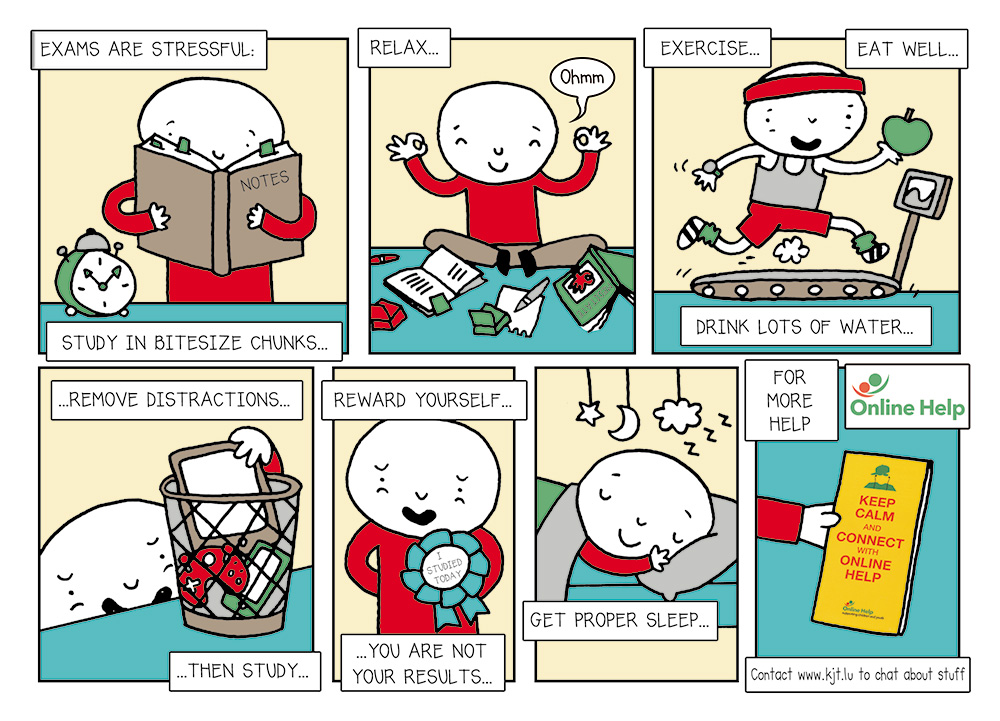Exam stress

Exams are stressful
The exam period is equally stressful for young people and adults. Stress is a normal reaction to a challenging situation, and can cause symptoms that are not only unpleasant, but in some cases even have serious consequences.
Stress heightens our awareness and makes us more alert. In the school context, this means that we are more aware of the negative consequences of being unprepared.
This in turn is an important component in the context of stress caused by exams and sometimes serves as an incentive to work harder and achieve better results, which then has a positive effect. However, stress can also cause you to lose track of what you are doing and to feel overwhelmed.
Signs that stress is becoming overwhelming are: Mood swings, tears and tantrums when one is more argumentative than usual, difficulties related to sleep and physical symptoms such as headaches, stomach aches, loss of appetite or overeating on comfort food. In such situations, one is also more self-critical.
What can help to cope better with exam stress?
When these signs of stress are recognised, one should talk openly about the symptoms and consider how to find a better balance again. This means looking at what can be done on a physical, mental and emotional level to prepare as well as possible for the upcoming exams, and the stress that comes with them.
Dealing with stress varies from student to student. However, planning and preparation are skills that everyone can learn. It is important to find out what is helpful for you in dealing with stress and to find your own learning style.
Physical level
To be physically prepared for this demanding time, students can do some easy things. These include eating a healthy diet, such as having healthy snacks with you, and drinking enough water. Eating regularly and getting enough sleep are important foundations against stress.
When students are working at home, it is useful to establish a routine that is NOT the same as the weekend routine: get up at the same time, get dressed, eat meals, exercise and have a finishing time.
Regular exercise is also very important, as it has been proven that short, brisk walks help to improve memory, regulate emotions and increase energy levels. A little time out from our digital devices is also good for everyone and helps to fully switch off – especially in the evening and at night.
Mental level
Although everyone is different and learns differently, it can be beneficial to know a few things. For example, how to divide information in the most manageable way, how to make a revision plan and a timetable. Most schools provide a general template, but some students need extra help. Involving parents can also be of great help: they can also help you stick to the revision plan at weekends, during holidays and during exams.
Here are some clues to create a revision plan:
- Has each subject been divided into clear learning blocks or learning areas?
- Has thought been given to meal breaks? Has time been set aside for sports and social activities?
- Has thought been given to what to revise? At school, in the library, or at home?
- Are there different revision techniques? E.g. practising from old exams, marking important theories clearly, learning visually using mind maps, colour-coded notes, using key words and definitions, and quizzes to test yourself?
- Have you thought about a study partner/group with whom you can review the exam material and exchange tips on how best to cope with exam stress?
Emotional level
Some students feel bad about taking breaks. But pursuing hobbies, staying active in sports and socialising is important. Without a good balance, stress levels can increase quickly.
In general, you can implement the following tips if you want to take care of your mental health:
- Talk to a trusted person or professional
- Include rewards in your revision schedule, such as going to the cinema with friends.
- Use mindfulness or meditation techniques
- Go for a walk or a bike ride in the countryside
- Use essential oils in a diffuser for the study room
- Take a hot, bubbly bath
- Take a nap
- Watch a favourite movie
- Make a list of things to do when you are stressed and low on energy



